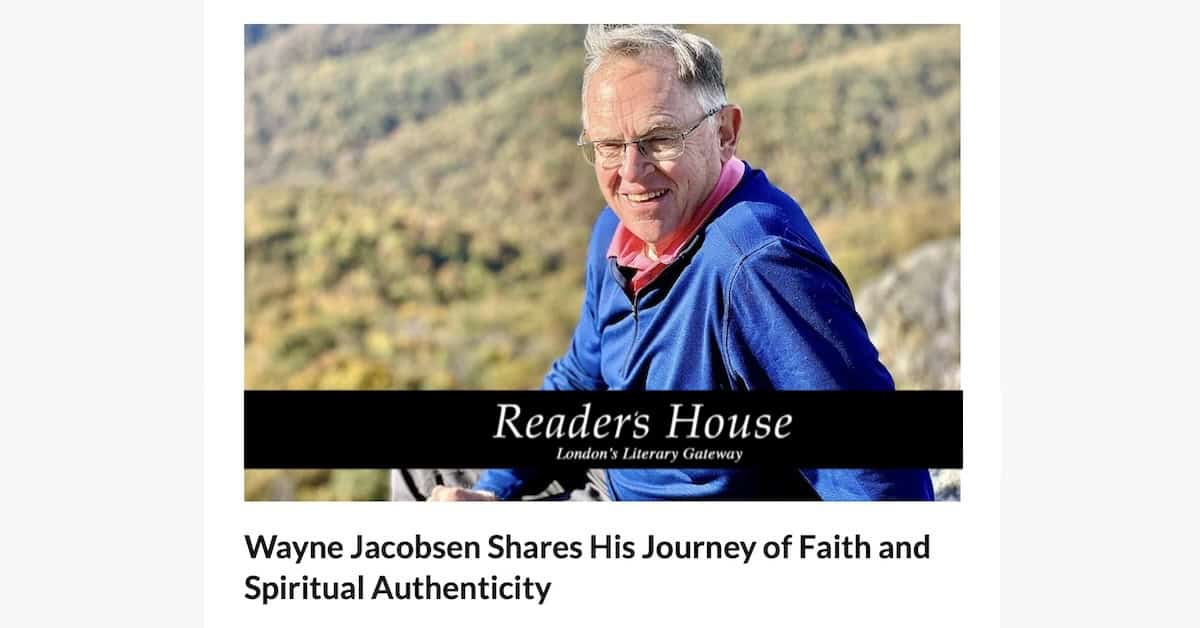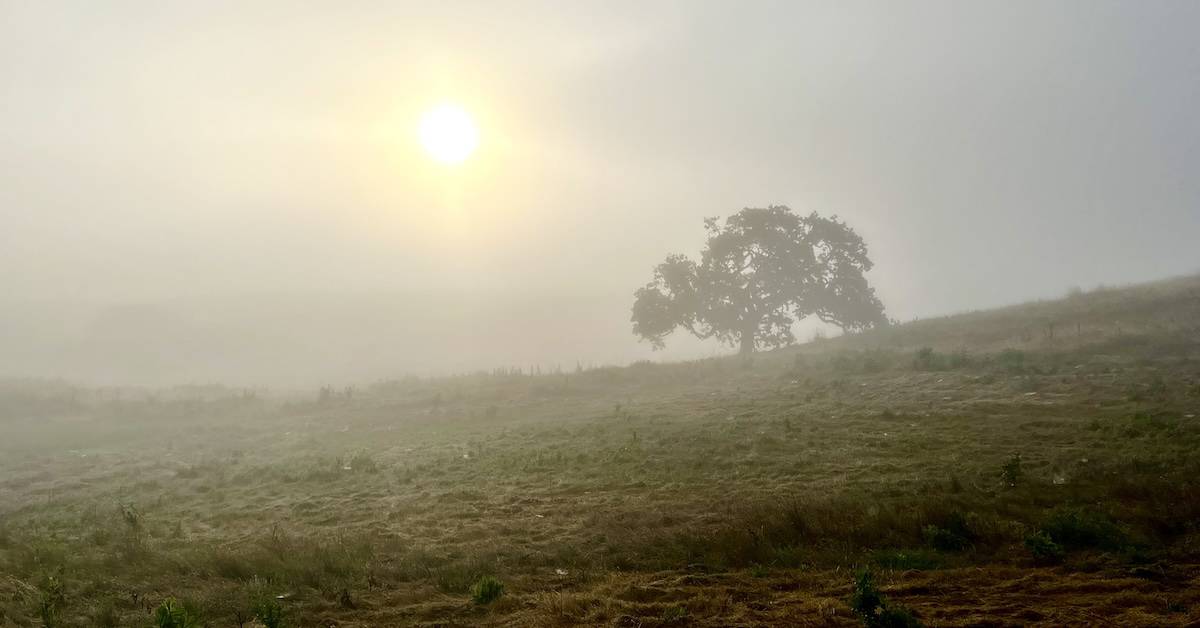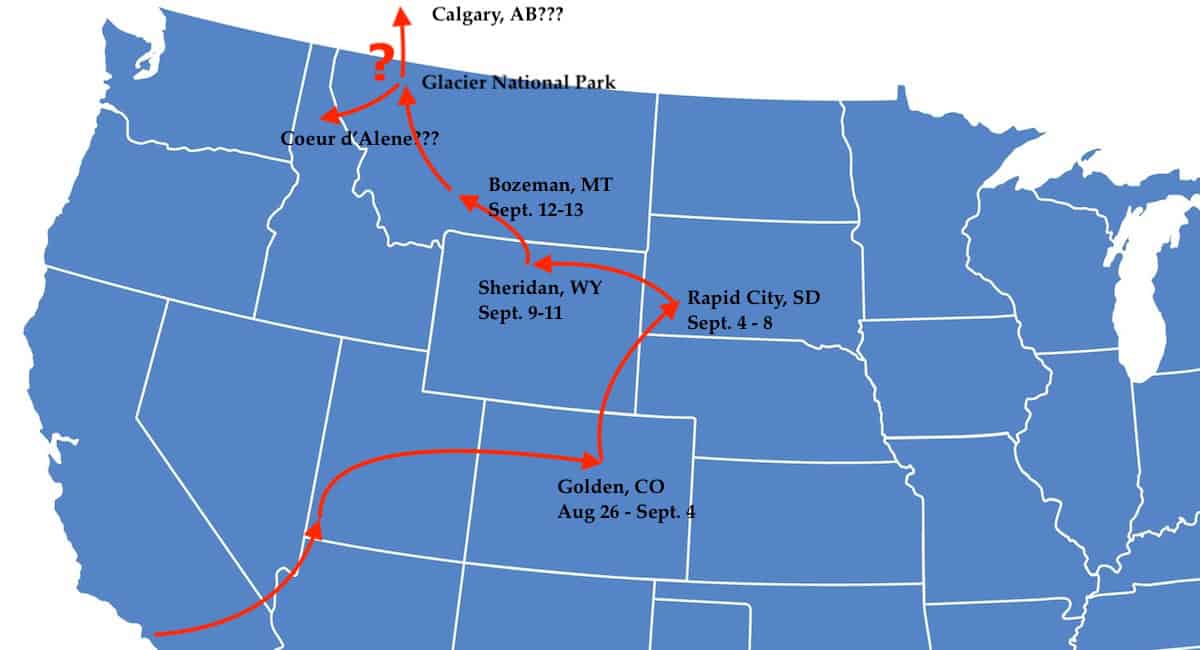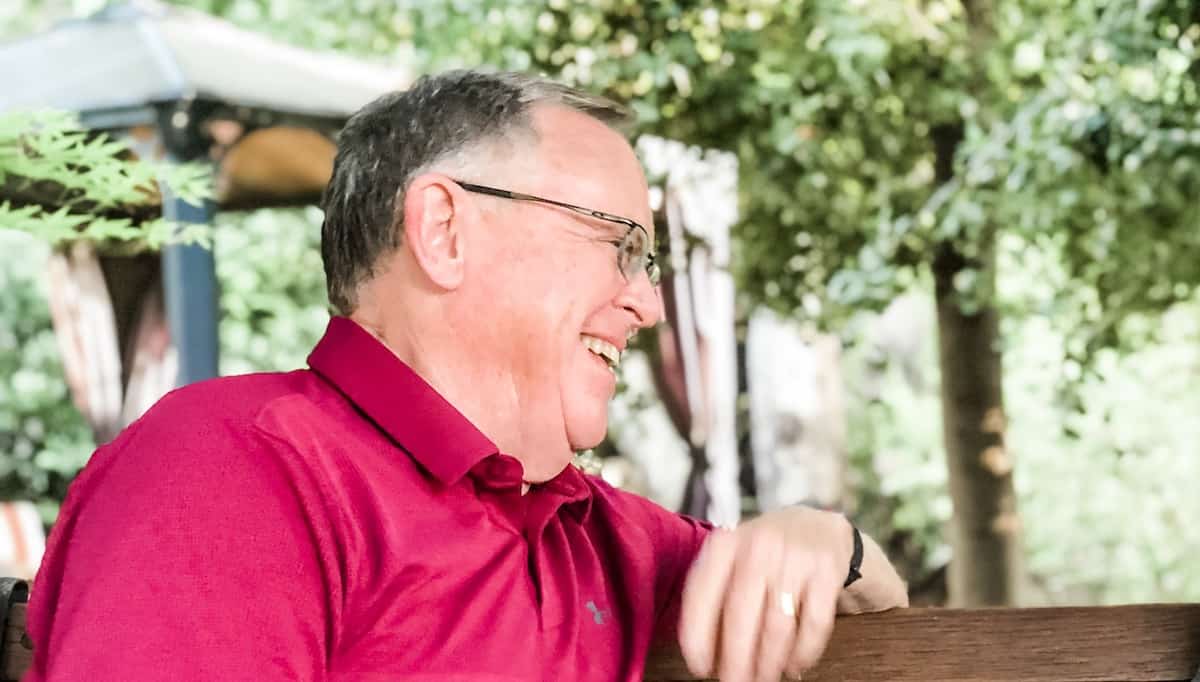Jon: Somewhere along that journey, I discovered The God Journey podcast, and I started listening as often as I remembered to. The episodes that I have heard over the years have been such a blessing in my spiritual journey. After some trial and error, I came to the conclusion that maybe he doesn’t want me to start a house church, but maybe he just wants me to learn how to love my neighbors and those that he brings into my life, and I learn how to experience his love in my own life on a daily basis. My life hasn’t been perfect, and I have gone through some tough times, like my 17-year marriage ending in divorce in the Fall of 2011, but I have loved having Lifestream and the God Journey to help mentor me and speak to my heart as the journey has moved forward. I am looking forward to seeing where this journey takes us in the coming months and years beyond episode 1000!
Miche (Ohio): The conversation with God over and over and over while listening all these years:
God: Did you hear that?
Me: I heard something. Can you help me overcome my fear of thinking about that?
God: Yup.
Me: Thanks! I like these guys.
God: Me, too.
Dieter (Germany): The podcasts I’ve heard, along with the books and personal meetings, the best way to describe them for me is that you have been great helpers of my joy. Sometimes I feel that Religion still poisons my life, but often what you share echoes Jesus in my journey of life.
Ron (Ohio): After numerous attempts at getting God’s approval, including counseling, 12-step groups, self-help books, church attendance, Bible reading and memorization, watching television preachers, and listening to radio preachers, I finally came to the end of myself. That is when the real God Journey started in earnest, close to 15 years ago, when I found this podcast, or when this podcast found me. The kicker was during one of the openings, with these words from Brad. ‘The God Journey… those few words say an awful lot of true things. This isn’t my journey… I am just a supporting actor in a greater drama that isn’t about me.” Learning humility, how to rest, love, and play in the Father, finding true community where it is least expected, in the unorganized places…a God Journey that is not in my control, but God’s. And that has made all the difference.
Jeff: Hey Wayne, Sara, Brad, Kyle, and all your awesome guests, thanks so much for all the podcasts over the years. You have all given me a picture of what “living loved’ looks like as we go about our daily lives. Your words have encouraged me through my own religious deconstruction through the years. I’ve learned about “yuck meters” and true authenticity. I look forward to every Saturday or Sunday morning to soak up another series of insights. I love laughing with you all as well as feeling your pain and sorrow. Your words and discussions have enriched my life in so many ways. I feel empowered to live in His love and express acts of kindness to others.
Douglas: I have been listening for probably 15 years and can hardly wait for each episode. You, Brad, and Kyle have truly blessed my heart over the years. I have read your books and been blessed, and just finished chapter 21 of It’s Time. The thing that has blessed me the most is that you give your thoughts and opinions, but you always encourage me to, not believe you but to check everything out with my own studies and the Spirit, and see if it is true. That has taught me how to listen to what Father wants me to know, do, and be. Thank you for always giving me things to ponder and seeking God in my God Journey.
Simone (Austria): As an enthusiastic podcast listener from Austria, I am pleased to be able to speak up. A few years ago, I read your book He Loves Me. It had appealed to me, but my heart was still so caught up in legalism that the truths could not fall on prepared ground. Seven years ago, after many years of legalism and serious but desperate discipleship, I found myself in a desert. I was totally burned out, taken out of the race, and I just had to capitulate. There, I had only one question: “Who am I?” Over the course of several years, Jesus took me by the hand and taught me step by step who Heavenly Father was and who I was. I came across the book, Finding Church, and was shocked. It accurately described my situation and that of my very legal church. Suddenly, I noticed that this book was by the same author as the book He Loves Me and So You Don’t Want To Go To Church Anymore. My curiosity was aroused, and I went online in search of sermons from you, Wayne. That’s when I came across Transition, and I was totally moved. These lectures helped me so much. And then I searched your website and came across The God journey. I was so hungry for these truths and wanted to know about people who lived what you had talked about in the talk. I didn’t know any Christians around me, and I was so grateful to see you, Wayne, and Kyle, who talked about it and lived it in their lives. I then listened to your podcasts and soaked up everything that tasted like life and freedom – and there was a lot of it!!! It was my provisions and my comfort in my legalistic environment!! I have been able to learn so much from you over the last few years. I experienced your crises and victories a bit and you were role models for me! Thank you!!! And what was one of the most exciting things for me: not only did I experience change, but I was able to experience “live” in the podcast how you changed under the loving gaze of the Father. I felt how, in your brokenness due to your marital crisis, you, Wayne, became softer and gentler. I think you can even see that in your voice and in your warmth. And you, Kyle, through the years that I “follow” you, you have learned so many valuable insights and, above all, pastoral help for yourself and passed it on to us. Without your podcast, my life would be a lot poorer and more joyless. Every Friday, I look forward to each new episode and often listen to it more than once until a new one is released. I am fascinated by the fact that God can connect hearts over so many kilometers and from such different cultures. But that’s what the Bible says. What a privilege that I can experience it in my life. I thank you, and I am happy that you have such a big heart for brothers and sisters who have also set out on the God journey! Thank you. Thank you. Thank you!
Nicolai (Netherlands): I started listening to the podcast sometime in 2007. It was very nice to listen to a podcast that gave me insight and words as to why I was actually so reluctant about how the church often does things. But it was the same podcast and the book He Loves Me that made me realize that being loved and trusting Father, which implies that I don’t have to convince others that I am right (still a process ). Earlier tonight at the grocery store, a woman started talking to me after I offered my help in grabbing something for her from the top shelf. Her husband had recently died after 16 years of marriage. Ten years ago, I probably would not have been able to bring myself to listen to such a person without judgment and would have felt uncomfortable and struggled with whether to pray with her, tell her the gospel, then feel guilty for not doing it, judge myself, etc. I still haven’t walked on water, raised a dead person, healed, or brought someone to faith in Jesus. But this evening I could be there for her and really listen for a moment. Are these the greater works? At least a work in me and the podcast certainly contributed to that.
Jenny in the U.K.: I’m grateful in the podcast that you always stepped away from the idea of ‘being a follower of Wayne’, and gently encouraged there to be no middle man, to be ‘a follower of God’. It could have been so easy for me in those early days to put you up on a pedestal and follow you, and the ideas that you had introduced to me, instead. Being young and early in my proper freedom in God, I got frustrated easily that I didn’t seem to be progressing, and God didn’t seem to be doing what you said he would do if I came to rest and relax in him. Yes, my thinking was still tangled in some of those old ways of thinking still! So, what The God Journey meant to me at first was a slaking of my need and desperation to know how to get to know God more and find this new reality. I drank up your and Brad’s words, like they would save me. Gradually, gently, without me even realising, God’s work behind the scenes in my heart, my thinking started to transform, and I intuitively began to feel God’s heart more (though, with plenty of mistakes along the way, and always probing to see if things that I thought were true or not). Instead of desperation, a need, The God Journey came to be an enjoyment. You and Brad, then you and Kyle, provided a companion with whom to chew over ideas and thoughts. A relaxed sharing of your thoughts and experiences to ponder on my own God journey. I really appreciate how you enabled this through stepping well away from any encouragement to ‘follow Wayne and Brad/Kyle’. The God Journey enriches my thought-life and encourages me regularly in my journey with God. My life is incredibly horrific right now, and I still have much pain between God and me, but I always look forward to listening to The God Journey. Thank you to you, Brad, and Kyle for The God Journey podcast.
Stephen in Japan: For me, personally, your voice in particular has been one of the most influential voices in my walk with Jesus over the years. A big part of that is that I love the fact that you don’t take the didactic path, but instead draw out ideas in conversation in a way that makes me, as a listener, feel like I’m part of it. I also appreciate your openness to new exploration and growth. Instead of staking out your territory and just camping out there, as so many do, you really do seem to be on a journey yourself. It has helped me to detox from the human-constructed organization of ‘church’ and open my eyes more to the living Body of Christ. So, here’s to another 1,000 episodes, more sacred cows tipped, and more extended burns where Simon misses his stop as a result.
Jack (South Carolina): I was first captured by you and Brad just before The Shack was released. I remember when you started talking about sacred cow tipping. (I even bought the shirt but I wore it out.) and knew I was listening to the right guys. Oh, how I loved those conversations early on. It was like you and Brad were discovering and learning how to live and love without religious overtones and obligations. Your “slinging freedom” in conversation often became fits of laughter in which I, like many, I suppose, loved to hear and join in. I am so grateful for the God Journey and all that you, Brad, and Kyle have done to keep it alive and going. You cannot imagine the impact of joy and understanding you all have had in my life. Looking back at your second podcast titled, “The adventure of a lifetime”, that title could not have been more appropriate.
Kate: As you approach a milestone, I would like to say thank you. Sara, your courageous, vulnerable, and honest offering of your story on several podcast episodes has been such encouragement for me. Rarely in Christian circles do women leaders share the struggle, the now and not-yet of healing, and the regret and the tension of wondering. You are an inspiration to me as you struggle with the past and consider how to “be” fully you, fully Sara in the here and now. Wayne, your understanding of God’s unconditional love and your pursuit of authentic communities and relationships has supported my journey in such a foundational way. I have been listening for 14 years after I read the book, So You Don’t Want to Go To Church Anymore. You showed me that it’s okay to long for more—long for relationships beyond meetings and programming. Your words have revealed again and again that over-functioning and exhausting performance does not equate to a greater threshold of God’s love or power. Most importantly, I grew up thinking that if I just did all the “right” things, my idea of the “great design for life” would unfold. When life didn’t happen as expected and I was suffering with despair and regret, your words helped me understand that the love of God does not guarantee my idea of a great life. Thank you for awakening me to a more expansive perspective. I am so very grateful for the podcast, for the blog, and for the books that point us to a deeper experience of living real and living loved.
Jeff (Colorado): Years ago, as I grew more and more disillusioned with church and all of the junk that goes on there. Not to mention a source of deep wounds for me, I was prepared to endure another lecture when the pastor told us that there was this new book we should avoid—The Shack. I was searching for it on my phone as he droned on with the lecture. I downloaded it and had it read the next week. This was the first time someone told me that the finger wagging at me was “especially fond of me”, rather than “especially disappointed with me”. Mind blowing, unimaginable, counter to all I had been taught… could it be true? Then I had to know who wrote this story. I easily found the author, and then I discovered The God Journey. I think this would have been in early 2009. I was hearing thoughts, ideas, and questions that I had had for years, but was told were wrong. When I heard the idea of taking a new believer and having them spend a couple of years just focused on what it means to be loved rather than what it takes to get God to be happy with me, I had to start. I spent 5. During that time, I began to see that it was possible. I started to see our employees, customers, and almost everyone in a new way. I learned to get up each day and think, “Okay, what do we have to do today?” That led me to a man one day, in his home, in a sales call. He was a cop in a high school. We live near Columbine, and while this cop wasn’t in Columbine, all school cops in this area are on a different kind of alert. That got us talking, and that led to his daughter. First, he told me he was raised in a strict Church of Christ environment. His daughter had gotten pregnant in high school. Then married a different guy soon after and had another child, then cheated on that husband with yet another guy. He called her “white trash”. There isn’t much to say to that. It is heartbreaking to hear. We have daughters. My sister became pregnant in high school, too. I cannot imagine being that disappointed in one of our girls. In the middle of this conversation, I found myself thinking, “Okay, God, how in the world can this be what we have today, because I have nothing?” And out of nowhere, I thought of the story of Jesus and the adulteress. I asked him, “After Jesus wrote in the sand, and the guys left, what did Jesus tell her?”. The cop quickly said, “Go and sin no more”. I actually had to remember, Oh yeah, that is in there too. No, I said, the other thing. He didn’t know. When I said, “Your accusers don’t condemn you, and neither will I”, I had chills. I mentioned that the one who could throw the first stone chose not to. He still chooses not to for all of us. This helped define how I am loved. I still don’t know if that moment was for him, for me, or both. It doesn’t matter. I left his house, and all I could do was replay the conversation over and over and then ask, “Why in the world would you tell her to stop sinning?” Don’t you know better than to tell us that. I joined a friend for lunch, thinking that since God knows better, “sin” must not mean what I think it means. We had been meeting for a few years by this point and had read He Loves Me, Bo’s Cafe, So You Don’t Want to Go To Church Anymore, and listened to the podcasts. We were part of the expanding conversation. We talked it through, and after a couple of weeks, my friend brought the verses “My people have committed a compound sin: they’ve walked out on me, the fountain Of fresh flowing waters, and then dug cisterns— cisterns that leak, cisterns that are no better than sieves” BOOM. This could be the “sin” that Jesus was referring to. After committing what was said to be sin, adultery, and feeling that God was disappointed in her, she just gave up and gave in to the wrongdoing. If she understood that he had it all covered and there wasn’t much she could do to earn it, that the one who could condemn her chose not to, it would be easy to accept that living water. She was loved! I am loved! I think that I might be figuring it out. I am one of the goofs who went back and listened to all of the podcasts. Many of them, over and over again, I have found that things I thought were just “contrary thinking” on my part that should be kept to myself were also being thought about and talked about by other believers all over the world. All part of this ever-expanding conversation. I had been following doctrines, the current “translation” of the Bible, and a conformance-based organization. I didn’t need to ask that question, “Ok, what do we have today?”. Learning to do this changed everything. When you launched the “This Changes Everything” series recently, it really did help to remind me that our efforts to be righteous are just building cisterns and that building those cisterns is just the second step in rejecting the Living Water. And, then, “Jesus not telling us what to believe but how to live, and yet the creeds are ONLY telling us what to believe”. More change. After almost 1000 podcasts, I still look forward to what the conversation will bring next, what we might have to participate in today. Thanks to all who are part of the conversation, but it doesn’t cover it. It is all I have at the moment. When the podcasts end, I will probably go back to the beginning and start over. Just to see what I may have missed.
John and Jill (New York): We are regular listeners of your podcasts for probably at least 15 years. Many aspects drew us into your orbit of sharing and living loved. Number one is interesting, given that we are about the same age (71), married for 50 years this past June, and more importantly, share some parallel paths that were walked. You left your church in a major awkward power play, and we left our church of 25 plus years, deeply invested in elder and deaconess activities over disputes with the pastor, who really did not like our influence and direction, which was at odds with his personal desires. God told me to leave in a dream, and we have not looked back at all. Your sharing “He has more to teach you if you leave than if you stay,” has been on the mark for us as well. Our old church “friends” are no more … and I am sure they cannot understand why we have not connected elsewhere in another body. After many hard conversations just before we left the church… and God telling us to leave … I felt like I was a fighter pilot being ejected and just enjoying the parachute ride to earth in complete silence! Many thoughts come to mind that impressed us with your podcasts:
- You certainly lived out what you teach in your recent tough times with Sara’s trauma. You totally committed to what the Spirit was telling you to do while it was at odds with your personal desires … and no “caving” in—an amazing example of God’s love flowing through you and depending totally on Him.
- We sense your teaching is authentic … without ulterior motives and certainly absent of a need for “cash”
- When we attended one of your local meetings with families in Massachusetts, similar to your podcasts, you didn’t come with an agenda that you tried to “fit in” to the conversation. You listen first, and then responded with what God puts on your heart.
- You have introduced us to “My Friend Louis,” Father Gregory Boyle of Homeboy Industries (and others that you have invited to the podcasts ), with similar authentic experiences of living life with the Father.
- You address current events in a way that sows the seeds of peace and trust in the Father’s love.
May your podcasts and other activities continue for as long as the Lord leads. You have been a blessing to us and several of our close friends.
Lyndon in South Australia: When I first contacted you about my story, some years ago, it was about 18 months from the event that changed the worst day in my life to the best one. The false accusation that blew my world apart but was then retracted had taken me from contemplating a really dark end to suddenly being surrounded and permeated by a physical, tangible presence of God I had never experienced before. Inside that presence over the following days and weeks, I was numb, like I had died but just hadn’t left my body. So I often just sat confused, but enveloped by this undeniable feeling of God that was the real thing to me. I finished the “Jake book” I had just started before the blowup, and it reignited, along with my current experiences, a deep longing to know this God I was feeling right now, as opposed to the God I had abandoned some 20-plus years ago. When I tried to imagine what this looked like ahead, I saw nothing. All I knew with absolute clarity was that it looked nothing like the religious picture of God from my past. It wasn’t so much a choice as to not even be on the radar to possibly compare. The big issue was my mind, which couldn’t make rational sense of any of it. I look back now and I see my mind as this programmed dystopian world ruled and constructed from experiences from the world, religion, and learned self-preservation. A landscape of fortified bunkers with loudspeakers on tall towers constantly feeding me a narrative of lies about myself and God. Then I tuned into the GJ. I can’t tell you how incredibly therapeutic it was to listen to voices that talked about a reality of God that aligned with everything I was feeling on the inside. The banter, the honesty, the humour, the listener engagements all centred on this idea of relaxing into a reality of “living loved”. I had never heard God discussed in such a relational way by people outside the religious sphere with no monetary agenda. The dialogue was so refreshing to me, and it helped to reshape and challenge so many preconceived ideas I had just accepted about God’s character. I even went back and started listening to the first podcasts from 2005 onwards while I was driving to and from work and between jobs. It didn’t matter the subject material; what stood out was the presumption in the conversations that God is always present, loving, and looking to engage with us. It was always done in such a manner to never subvert or replace God but to direct us back to hearing God for ourselves. So thank you, Wayne, Sara, Brad & Kyle. Thanks for the willingness to be open, transparent, to share honestly your journeys, to be vulnerable, and just plain real. Today I still listen in, it continues to be a rich, fertile input into my journey with thoughts and insights that help give language and perspective in this ongoing discovery of God. Six years later, that presence remains as strong as it was back then; my kids have often joked, “Ah… Dad’s sitting in the dark again”. It’s true, I sit alone with the lights off and just marinate in this spiritual reality, which my mind deeply resents from not understanding hardly any of it. It usually catches up eventually, like hearing the late news at the end of the day. Today, trying to stare into the future, I still see nothing. God doesn’t seem to trade in certainty, just the assurance of trust in his goodness and character. I heard this recently: “God is not a mystery to be solved, but a presence to embrace”. I like that, I can do that. And I want to thank you all from the GJ people I have never met from the other side of the world for helping me see and experience this in my own journey.
James and Charla: We’ve been listening to the God journey since 2004. We both met in 1976 in a Bible school where we were learning to love and follow Jesus. We married that year, and I taught in the church, led worship, and later, we went to the mission field with YWAM. In the mission field, we didn’t attend church because there were none, so we were accustomed to walking a solitary walk with Jesus in strange lands. In 2002, we came back from the mission field to one of the churches that had supported and stood with us for years. However, there was a clear sense that we didn’t belong there any longer. The Holy Spirit actually began to tell us to “come out from among them”, even though we had friends there and were expected to join their leadership team. It would not come out until twenty years later that two of the most respected ministers in the church were having an affair from 1992 to 2012. In 2004, I began to truly wonder if it was right or wrong that we were not going to church and didn’t want to. So I Googled, “Why don’t I want to go to church anymore?”, and the first thing that came up, was the unfinished story of Jake Colson, and that’s how we were introduced to Lifestream and shortly thereafter, to the God Journey podcast. We’ve enjoyed it for many, many years, and have been encouraged by all of you for all these years. Thank you for making a sanctuary in the wilderness for so many of us!
Lisa (Ohio): You have been, for many years, and still sometimes are, my only community. My healing has been slow, from religious trauma, among other things. It began about 2009, when I began to feel the weight of the religious control. I sought out different institutions, experiences, trying to find the “real” Jesus—not some man’s opinion on who he is, and not truth through men’s filters. I stumbled much along the way, but each new iteration, which ultimately led to more disillusionment, kept leading me to him…process of elimination, I guess! I mean, I loved and served him for 40 years. But I had no real understanding of his heart for me. Enter Wayne. I met you for the first time in KY. I guess about 2015. Right as disillusionment had begun again in the place where I was serving. I was starting to believe for the first time that Jesus’s love for me was more than I could imagine, more than songs, and scripture, and the hyped up love bombing of people whose idea of being a believer entailed conforming. And when I never could, the marginalizing would begin all over again. I was not good enough. With the interpretation of the gospel laid down in your book, He loves me, I began to finally see a picture that made sense to my heart. A view of the Father not based in fear, superstition, or rules I never could somehow interpret correctly. Where striving ceased, and simply receiving became a place of rest. The God journey has been my church, my community. I have not found lots of people, so far, who are engaging and living free. (the feral faithful) I don’t get to technically interact with you guys in a relational context, though you have always been so gracious and faithful to address my struggles when I shared them with you, Wayne. I have been lonely at times. But honestly, it was more withdrawal pains from what wasn’t healthy to begin with. That carried discomfort, pain, and confusion at times. But Jesus has sat with me on my couch, wherever it was, and was with me in it. I’ve gotten to share from time to time with someone. I have a few friends who let me be me. I’ve gotten to love people I might have been afraid of before. I still get confused. I still get triggered into fear. But it’s less and less as time goes on. I don’t know what to do about that. I’ve just lost my desire to “do.” You have been there for me, my church in the world, and I’m part of the conversation in my mind as I listen and talk to God about what captures my heart. Maybe God intended more, but its where I am. I hope you guys don’t stop anytime soon, but I trust him; even then, he will take care of me. Wayne, I hope I get to see you again someday, but if not, I’ll see you with Jesus someday. Thank you for The God Journey and putting the pearl out there in the world. Thank you for the podcasts, and keep them coming for another thousand!
Pete (Maryland): Though I had read all your books, Wayne, from the first ones I bought from you at the Pa Coffee House back in ’05/06, I had not listened to any podcasts til My Friend Louis, which I couldn’t stop listening to over two weekends. And then what a blessing to have you in our home several times since The Shack came out. But it wasn’t til you had to cancel your trip to be with my dear 50-year friendships in Austin that I knew something serious had taken place. Several months later, when you told me I could catch up with your ‘life’ by listening to the podcasts starting with Unforeseen Circumstances. I listened to all of them that Labor Day weekend and wept through them as it was a similar story of Candy’s trauma and our story back in 1983-1993, though I did not respond as you did, and thus the 10-year journey through it. I would highly recommend every husband, especially the 50% plus who are married to one who was exposed to such trauma in their childhood or youth. Your podcasts, especially with Sara, so opened my eyes to what Candy was experiencing [40+ yrs ago], and how I could have been a helpmate to her as you were to Sara. What an example for other Christ followers today!! I am so grateful for the Lord’s love and kindness and patience with me in healing our marriage and giving us four incredible years while the boys were in high school, prior to cancer taking her life. For the past three years, I haven’t missed a podcast and listen to them usually several times by the weekend or beyond!!! Keep them coming!
Alisa: I just wanted to share what the God Journey podcasts have meant to me (and also my family, especially my husband, Mark) over the years. I first found “you” after reading The Shack and doing some online research about 18 years ago. We have listened to your podcasts with Brad and now Kyle, off and on throughout those years. My husband Mark and I moved to Thailand just before my 40th birthday in 2001. We were both registered nurses and joined a team wanting to do medical clinics and community development with impoverished Hill Tribes in Northern Thailand. Mark had said when we moved here that God had spoken to him, saying that, “About 20% of the work I will be doing through you…and about 80% of the work I will be doing within you”!! Well, that has certainly been true. Our “God Journey” here has been most fruitful in helping us grow in our knowing and experiencing Him – especially outside the box of Christianity. Having your books, especially He Loves Me and The God Journey podcasts, has been incredibly helpful in affirming our journey. Through these podcasts, you have honestly been a big part of our faith community (without actually being present). We not only listen, but also have many discussions revolving around the podcasts. Knowing there are others out there along the same path has often been a huge comfort in many ways. Before moving here, I had no idea how deeply immersed the missionary community would be in religiosity! We often find ourselves without any like-minded believers to share with in person. I also want to mention that the “Love, Rest, Play” teaching has been especially helpful to me personally. Through the years, I have read, reread, and listened to the audio version of He Loves Me! While this has been helpful and impactful, I have still really struggled to “remain” grounded in my experience of His love. It’s like I have believed it 100% in my mind, but somehow it just wouldn’t come through (despite many tearful prayers) into my heart. But something about the love-rest-play combination and hearing you and Kyle continue to expound upon that concept has really started to seep deeply into my soul.
Jill (Texas): Others will put it more eloquently, but simply stated, The God Journey has brought me from death to life. Drowning in a fear-filled, performance-driven life, He Loves Me and The Shack opened my heart to experience daily that I can live loved by Father. His forever love enabled me to enjoy an Alaskan cruise with no fear of drowning!!! That’s a big deal coming from someone who can’t swim. About the trip: how a sharecropper’s daughter raised on a dirt farm in central Texas could find herself in the luxury of a Viking cruise, experiencing the majesty of God‘s creation, is beyond me. God‘s greatest gift came in the relationships that were developed – the people I got to love, encourage, and pray with were definitely the highlight! The ripple effect of God‘s love being dropped in places you never expected to be can’t be measured or predicted, only experienced.
Lisa (Florida): You guys are the ones who know how to put your thoughts into words so well, which is one of many reasons I enjoy listening to your podcasts. For those of us who don’t have “community” as you often describe, you are our community. It is encouraging, sometimes challenging, and often a blessing to our hearts to hear you talk about what is living in our own hearts and minds. I can’t thank you enough for the time and effort you have given, leading up to the #1,000 podcast. That is amazing!
Jonathan: Wayne and Kyle, thank you so much for your honest and authentic ponderings you share with the world once a week through The God Journey. My dad turned me on to this podcast back in 2020 when the World seemed upside down and so unpredictable. You guys helped me keep my eyes and heart on Jesus as I was navigating the loss of a job due to the pandemic while having my second kid. I am so grateful for your voice as one that I trust. I may not agree with every single thing, but I trust your hearts that have lead me to ponder, and wrestle with matters of faith, sin, trauma, and belief. Just recently, I was really struggling with some as yet unredeemed struggles in my life, and the next day I listened to you guys talk about contentment, and it was like the Holy Spirit just whispered some things to my heart that just took me back from striving to rest. This happens so much. I really, really love you guys. I bless you and thank you! Here’s to the next 1,000 episodes!
Patrick: For me, the journey began with discovering Jake’s Story online. The adventures of Jake and John gave focus and a language and companionship to a journey that Father had already been inviting me along . . . and then as I listened to the intimate conversations of Wayne and Brad (as well as Kyle now ) the truth and reality of relaxing in Father’s love and affection began taking on substance and form as that journey matured. To try and write a brief synopsis of TGJ’s impact on myself and my family feels like trying to drink from the flow of the Iguazu Falls, but suffice to say that I am eternally grateful for Father’s kind guidance through each of your lives and voices. Thank you to each of you and your many guests over the years . . . the seeds of love that Father had for me to experience were watered and harvested because of your honesty, transparency, and vulnerability. Looking forward to the Family Reunion that is anticipated from the Trinity’s love and relationships.
Georgia: The God Journey has meant so much to my life and my walk with the Lord. I’ve listened to every podcast once or more. My life has changed from legalism and dictatorship to a loving walk with the Lord. What I have learned through the God Journey is a new life in Christ. Thank you from the bottom of my heart.
Charlie (Pennsylvania): The impact of the God Journey on me is like the difference between a movie and a TV show. In a movie, details, character development, and timing are so abbreviated that it’s difficult to bring in the humanity of an individual or a story. A TV show, on the other hand, is able to include the mundane, the down moments, and let us truly get a glimpse into the ordinary life of the characters that the movie format doesn’t dig deep enough into. The God Journey has been the TV show perspective that I and countless others have needed to see glimpses of the Journey regularly unveiled. Not just the highlights or catchy quotes, this way of sharing has brought us the person of Jesus rarely brought out, in the gentle but funny ribbing you give each other, more quiet but insightful world event commentary, and the real intimate events of your lives that make listening so relatable. Because of this, the God Journey has been a star in the heavens, consistently there through life’s seasons, giving light, food for thought, and a gentle reminder of Jesus’ directions and presence in the world. It boggles my mind to think back, as my time with you started mid-college (2008) and has now spanned first jobs (you’ll remember my emails to you, as the mail room guy), engagement, marriage, and four kids. The God Journey has been a needed gentle whisper of life and God through it all. For my wife, the podcast has been a different experience, but like the way Father weaves it all together – just what is needed for her Journey. Not coming from a Protestant background, or considering herself wanting to be all that close with Jesus, the God Journey has been that voice that has just the right touch. Avoiding the preachy nature of many Christian voices that have been a huge turn off, The God Journey has been at a human level relatable, and the right temperature to slowly wade in and try the water. The regular discussion of God’s love in a way wholly different from that traditional to Christianity, talking about forgiveness, the joys and struggles of parenting, and the other treasures of this Kingdom, are topics that continually draw us in. Thank you for simply sharing daily life, growth, struggles, and discussions between such kind, generous, wise, and down-to-earth brothers and sisters. The God Journey has been life-giving, inspirational, and thought-provoking, and I’m hoping to have the companionship and life commentary for many years to come, to share with my kids as they grow.
Matt (Western Australia): For me, it is in the name. It’s about God and the journey of His image being restored in us. Father, Son, and Spirit making their home within us (John 14:23). TGJ is about as routine as it gets for me these days in terms of weekly ritual. As a recovering Pharisee, I eased into listening many years ago, as I was extra cautious of anything religious. Though I loved your books, Wayne, and they helped usher in my freedom to live the life I loved, away from the tyranny of institutional religion—the futile quest to appease God by our own efforts. It is still a work in process, as we know how deep religion runs, but loving the daily moment-by-moment journey as He reveals himself more and more. It is such a dynamic process. Lately, it has been working through the process of embracing uncertainty, discomfort, insecurity, apprehension, and worry. It seems weird, but learning to befriend these dudes, as they are often the tools used to deepen our connection to Father and experience more of His presence. Rather than the futile struggle to keep them at bay, he’s teaching me to trust Him to walk me in and through them. This is where love, joy, peace, and life continue to grow. He is making us whole again and restoring His image in us. This is hard as He is dismantling the pride deep within us all. It is a dynamic life-giving process through the Spirit, and the best bit is that it can’t be controlled or contrived. We are wind riders, walking by the Spirit, and riding the wind is different for each of us. I am becoming more convinced that this is what scares the enemy the most. Institutional Christianity often paints a third-person God you can hold at arm’s length and objectify. Once you objectify him, you can try to replicate and codify just about anything to do with it in the seen, works-based world. Then it is easy to justify ways you control, coerce, and conform others to your perspective of God. Then the life starts to dissipate. None of this seems by chance. In this way, The God Journey has also been protective in honing the yuck meter to the false and inauthentic elements of the journey.
Cyndi (Virginia): A friend introduced my husband and me to The God Journey in mid-2024, so we have a lot of material to catch up on! Imagine our surprise when Wayne met with members of the religion we had been part of all our lives on his trip to Boise, ID, in July 2025! The group is relatively small and has no official name, so how did it come on Wayne’s radar? My husband and I left the group in Fall 2023 after learning about massive Child Sexual Abuse that had been, and continues to be, covered up by the ministry for generations. Through your podcast and the resources available on your website, Lifestream.org, we are finding a pathway forward, learning what it really means to “walk with God”. You are also helping us recognize when God brings people into our lives with whom we can have fellowship. It feels like this is what God was calling us into when he called us out of religion – not a structure, but a lifestyle. So to summarize what the podcast means to my husband and me, Wayne and his hosts have kind of been a combination of Eli and Moses to us: Eli because you are teaching us how to talk with God, and Moses because you are helping guide us through the wilderness. We appreciate that you always point us to God, not yourselves, so maybe there’s a little John the Baptist mixed in there too! Thank you for sharing without charge what God has taught you.
Bill: I’ve been listening to you guys for several years, and I’ve recently started listening to episodes from the archives. Even though I no longer have to listen to you guys to confirm what I’m feeling, it’s been a joy to listen to y’all’s journeys. You have introduced new words into my vocabulary, such as living loved, sacred cow-tipping, pharisectomy, and don’t “should” on me. Thank you for demonstrating what a real relationship with Father is like. Keep slinging that freedom.
Evan: Thank you so much for sharing your thoughts and experiences on The God Journey. It has meant a lot to me in these past couple of years that I have been listening. I am a recent college graduate, and I struggled to make the Christian campus life work. I attended InterVarsity for a little over a semester and stopped attending local churches after about a year and a half. My significant other also experienced challenges during their time too. I wanted to participate in a Christian community, but I just couldn’t find myself fitting in any of them. I started listening to the podcast around my sophomore year as a recommendation from my dad. The two of you had wonderful discussions on what it means to be a Christian and how to live loved. After a couple of months of listening, you released five episodes questioning how we look at sin (viewing sin as trauma). When I look back at how I felt during this time, I see it like scales falling from my eyes as I found a new way to look at the world of sin and shame. The justice vs. righteousness discussions were also incredible. All the teachings of a rigid truth of the Bible that I previously accepted with a solemn attitude were suddenly up in the air, and I was captivated, excited, and so hopeful that this way of thinking could be truer and better than the shame and fear that I was all too familiar with. I finally began to get myself out of the box that I thought I had trapped God in. In this past year as a student, I can recall a moment of my roommate having 1-on-1 with a group leader in which he said something along the lines of, “We know that anyone who does this is going to hell, it’s right there in the Bible!” with all the enthusiasm and matter-of-factness of a college student who has it all figured out. Now equipped with my very own yuck-meter, I held this declaration with a grain of salt. I don’t feel so guilty for skipping out on these organizations anymore. I learned that God will still find ways to talk to me and that sometimes a change of pace is needed. After all, I did attend church twice a week for almost my entire life before college. However, I don’t want to discourage anyone from participating in these groups. If you find value and comfort in them, I would suggest you go for it! Your podcast has been so helpful to me and is much of the reason my faith is as strong as it is today. Thank you for sharing a freer, more beautiful, and more hopeful way of living loved.
Who would have thought this little podcast would have such a profound effect on so many people around the world. Thank you to all who took the time to share their thoughts with us. We were all deeply touched by all of them and have been blessed beyond measure to be part of these conversations. If you want to add what The God Journey has meant to you, please do so in the comments below.








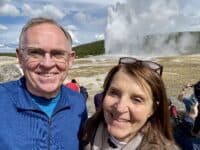 Last weekend we were in Yellowstone National Park, and yesterday we drove the Going-to-the-Sun Road (see above) through the heart of Glacier National Park. Such beauty is hard to contain, and we have felt wonderfully detached from all the political fear and animosity driving our world to deeper conflict and anguish.
Last weekend we were in Yellowstone National Park, and yesterday we drove the Going-to-the-Sun Road (see above) through the heart of Glacier National Park. Such beauty is hard to contain, and we have felt wonderfully detached from all the political fear and animosity driving our world to deeper conflict and anguish.
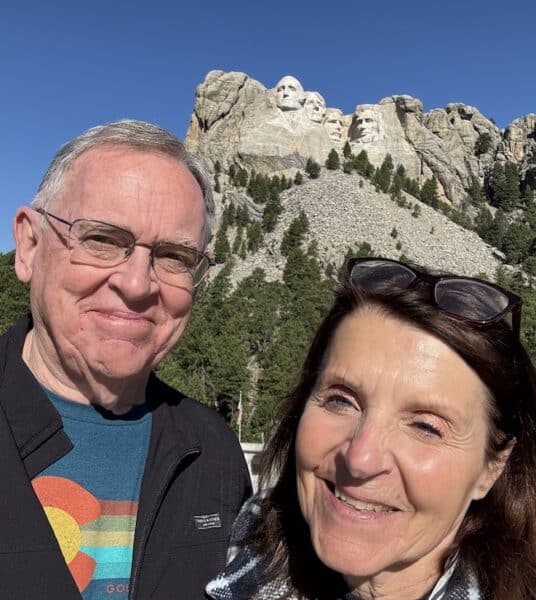 Sara and I will move on from Sheridan, WY tomorrow and head into Montana, still planning on getting to Calgary and then coming back through Coeur D’Alene and some routing across Washington and Oregon. We are also having days just to enjoy the beauty of the countryside around us. We spent a day seeing the beauty of the Black Hills and stopped to behold the Devil’s Tower. It’s a trip with great beauty in the Creation, and in God’s work among his people.
Sara and I will move on from Sheridan, WY tomorrow and head into Montana, still planning on getting to Calgary and then coming back through Coeur D’Alene and some routing across Washington and Oregon. We are also having days just to enjoy the beauty of the countryside around us. We spent a day seeing the beauty of the Black Hills and stopped to behold the Devil’s Tower. It’s a trip with great beauty in the Creation, and in God’s work among his people.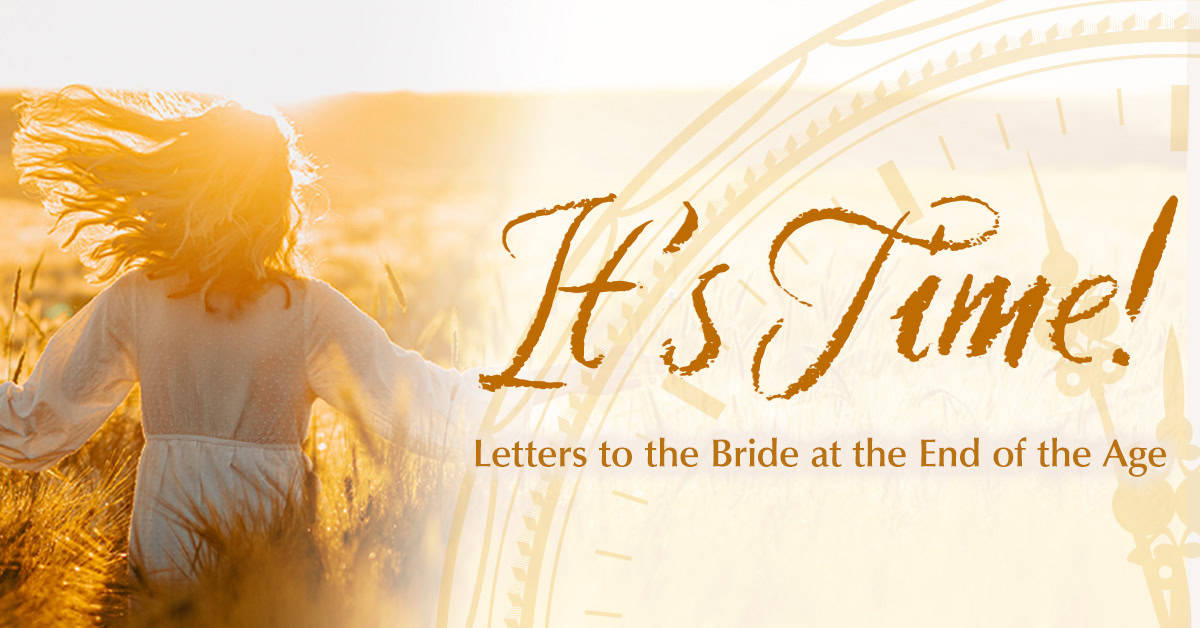
 This book has been a labor of love over the past three years. When God first put it on my heart to write it, I knew this would be a very different book for me. It would be like living loved on steroids, through the darkest challenges life can throw at us. What I didn’t know at the outset was how my life would be put through the wringer in so many different ways as I wrote it. Through it all, I have discovered a depth of trust in his love and rest in his work that has rewritten the script of my life in a wonderful way.
This book has been a labor of love over the past three years. When God first put it on my heart to write it, I knew this would be a very different book for me. It would be like living loved on steroids, through the darkest challenges life can throw at us. What I didn’t know at the outset was how my life would be put through the wringer in so many different ways as I wrote it. Through it all, I have discovered a depth of trust in his love and rest in his work that has rewritten the script of my life in a wonderful way.